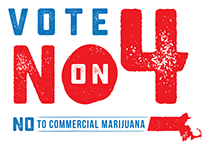ICYMI: Recovery High School Principal Takes Stand Against Legalizing Pot
NoOn4Lyric2016 2016-10-04T03:59:24+00:00"Why would we even tinker with the thought (of legalization) knowing what's happening to this generation right now?"
By Arianna MacNeill, as published in The Salem News
BEVERLY — While voters will decide whether to legalize recreational marijuana use this fall, the highest rate of users right now is a population that wouldn't legally be able to buy it, according to the principal of a high school for teens in substance abuse recovery.
Northshore Recovery High School Principal Michelle Lipinski, along with Dr. Sion Harris of Boston Children's Hospital, wrote a letter to Will Luzier of the Campaign to Regulate Marijuana Like Alcohol, dated April 20, accusing him of "trying to misdirect voters."
The campaign is the "driving force" behind a ballot question, which will appear before voters in November, that aims to legalize recreational use of marijuana in Massachusetts.
According to the campaign's "The Regulation and Taxation of Marijuana Act," people 21 or older would be able to buy marijuana and keep 10 ounces or less in their homes.
"On Friday (April 15), your campaign staged a press conference in which you labelled marijuana a relatively 'benign plant,'" Lipinski and Harris wrote. "We can tell you first-hand that marijuana is not benign."
In the letter, the pair describes how marijuana is 300 percent more toxic than it was two decades ago. They said scientific research has proven that the drug also negatively affects many aspects of an adolescent's development, from IQ to brain development.
In a later interview, Lipinski, an educator for 20 years, said she can't speak of the drug's negative effects on other age groups; however, the top reason adolescents age 12 to 17 enter substance abuse treatment in Massachusetts is for marijuana use, she explained. The rate of dependency drops dramatically after age 21, research has shown, she said.
In addition, research conducted by Dr. Nathaniel Katz, president of Analgesic Solutions, has shown marijuana use can lead to opioid use, said Lipinski.
"Why would we even tinker with the thought (of legalization) knowing what's happening to this generation right now?" she said.
Lipinski has met with educators in Colorado Springs, Colorado, where marijuana has been legal statewide for several years. There, marijuana use is much more complicated, she said — students don't necessarily smoke it, but may eat brownies, gummy bears or other foods containing the drug.
One of the problems with marijuana is the perception that it's harmless, according to Lipinski.
"It's not taboo," she said, adding that students at Northshore Recovery High School sometimes come in wearing shirts that include a marijuana leaf in the design. "It's just embedded in the culture."
In the beginning, adolescents may not see the negative effects of marijuana use. But eventually it can lead to interruptions in sleep cycles, eating habits, and other aspects of life, she said.
There isn't enough data yet from Colorado to show the full effects of legalizing pot, Lipinski said, other than it being highly profitable. If, in a few years, studies show it isn't harmful or doesn't have negative consequences, she acknowledged she may change her stance on the issue.
But for now, Lipinski knows from working with her students — and seeing some lose their lives to addiction — just how harmful drugs can be.

